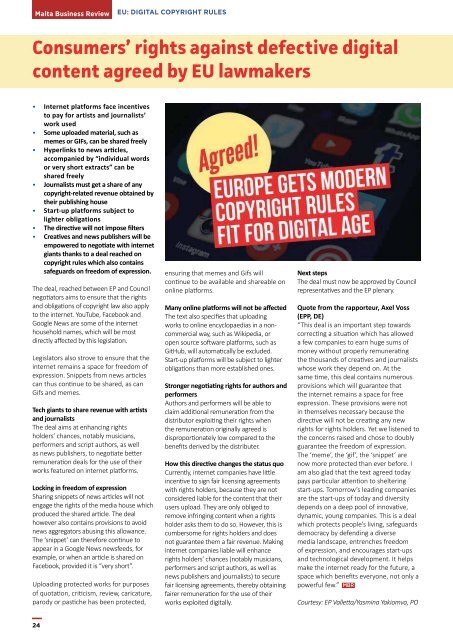MBR_ISSUE 49_MARCH_lowres
You also want an ePaper? Increase the reach of your titles
YUMPU automatically turns print PDFs into web optimized ePapers that Google loves.
Malta Business Review<br />
EU: DIGITAL COPYRIGHT RULES<br />
Consumers’ rights against defective digital<br />
content agreed by EU lawmakers<br />
• Internet platforms face incentives<br />
to pay for artists and journalists’<br />
work used<br />
• Some uploaded material, such as<br />
memes or GIFs, can be shared freely<br />
• Hyperlinks to news articles,<br />
accompanied by “individual words<br />
or very short extracts” can be<br />
shared freely<br />
• Journalists must get a share of any<br />
copyright-related revenue obtained by<br />
their publishing house<br />
• Start-up platforms subject to<br />
lighter obligations<br />
• The directive will not impose filters<br />
• Creatives and news publishers will be<br />
empowered to negotiate with internet<br />
giants thanks to a deal reached on<br />
copyright rules which also contains<br />
safeguards on freedom of expression.<br />
The deal, reached between EP and Council<br />
negotiators aims to ensure that the rights<br />
and obligations of copyright law also apply<br />
to the internet. YouTube, Facebook and<br />
Google News are some of the internet<br />
household names, which will be most<br />
directly affected by this legislation.<br />
Legislators also strove to ensure that the<br />
internet remains a space for freedom of<br />
expression. Snippets from news articles<br />
can thus continue to be shared, as can<br />
Gifs and memes.<br />
Tech giants to share revenue with artists<br />
and journalists<br />
The deal aims at enhancing rights<br />
holders’ chances, notably musicians,<br />
performers and script authors, as well<br />
as news publishers, to negotiate better<br />
remuneration deals for the use of their<br />
works featured on internet platforms.<br />
Locking in freedom of expression<br />
Sharing snippets of news articles will not<br />
engage the rights of the media house which<br />
produced the shared article. The deal<br />
however also contains provisions to avoid<br />
news aggregators abusing this allowance.<br />
The ‘snippet’ can therefore continue to<br />
appear in a Google News newsfeeds, for<br />
example, or when an article is shared on<br />
Facebook, provided it is “very short”.<br />
Uploading protected works for purposes<br />
of quotation, criticism, review, caricature,<br />
parody or pastiche has been protected,<br />
ensuring that memes and Gifs will<br />
continue to be available and shareable on<br />
online platforms.<br />
Many online platforms will not be affected<br />
The text also specifies that uploading<br />
works to online encyclopaedias in a noncommercial<br />
way, such as Wikipedia, or<br />
open source software platforms, such as<br />
GitHub, will automatically be excluded.<br />
Start-up platforms will be subject to lighter<br />
obligations than more established ones.<br />
Stronger negotiating rights for authors and<br />
performers<br />
Authors and performers will be able to<br />
claim additional remuneration from the<br />
distributor exploiting their rights when<br />
the remuneration originally agreed is<br />
disproportionately low compared to the<br />
benefits derived by the distributer.<br />
How this directive changes the status quo<br />
Currently, internet companies have little<br />
incentive to sign fair licensing agreements<br />
with rights holders, because they are not<br />
considered liable for the content that their<br />
users upload. They are only obliged to<br />
remove infringing content when a rights<br />
holder asks them to do so. However, this is<br />
cumbersome for rights holders and does<br />
not guarantee them a fair revenue. Making<br />
internet companies liable will enhance<br />
rights holders’ chances (notably musicians,<br />
performers and script authors, as well as<br />
news publishers and journalists) to secure<br />
fair licensing agreements, thereby obtaining<br />
fairer remuneration for the use of their<br />
works exploited digitally.<br />
Next steps<br />
The deal must now be approved by Council<br />
representatives and the EP plenary.<br />
Quote from the rapporteur, Axel Voss<br />
(EPP, DE)<br />
“This deal is an important step towards<br />
correcting a situation which has allowed<br />
a few companies to earn huge sums of<br />
money without properly remunerating<br />
the thousands of creatives and journalists<br />
whose work they depend on. At the<br />
same time, this deal contains numerous<br />
provisions which will guarantee that<br />
the internet remains a space for free<br />
expression. These provisions were not<br />
in themselves necessary because the<br />
directive will not be creating any new<br />
rights for rights holders. Yet we listened to<br />
the concerns raised and chose to doubly<br />
guarantee the freedom of expression.<br />
The ‘meme’, the ‘gif’, the ‘snippet’ are<br />
now more protected than ever before. I<br />
am also glad that the text agreed today<br />
pays particular attention to sheltering<br />
start-ups. Tomorrow’s leading companies<br />
are the start-ups of today and diversity<br />
depends on a deep pool of innovative,<br />
dynamic, young companies. This is a deal<br />
which protects people’s living, safeguards<br />
democracy by defending a diverse<br />
media landscape, entrenches freedom<br />
of expression, and encourages start-ups<br />
and technological development. It helps<br />
make the internet ready for the future, a<br />
space which benefits everyone, not only a<br />
powerful few.” <strong>MBR</strong><br />
Courtesy: EP Valletta/Yasmina Yakiomva, PO<br />
24
















